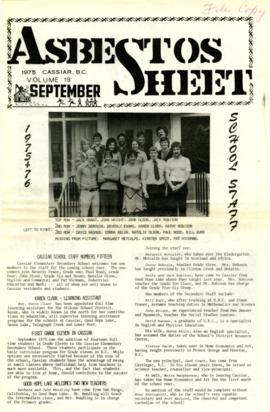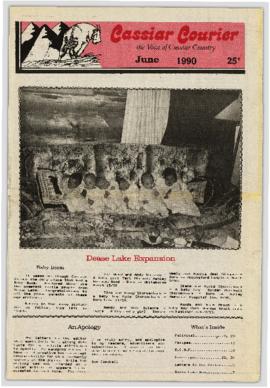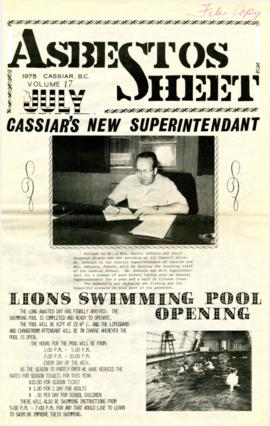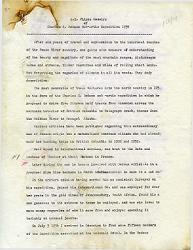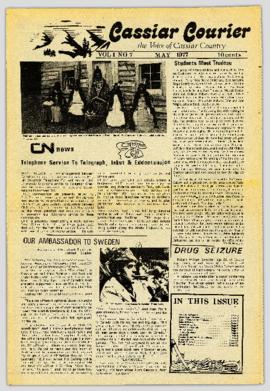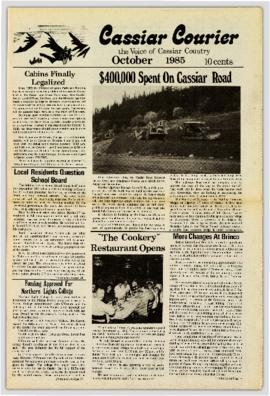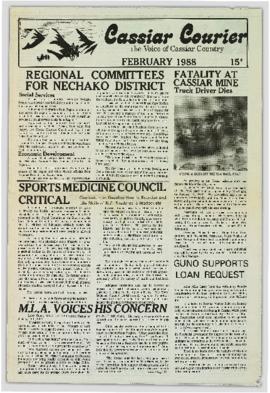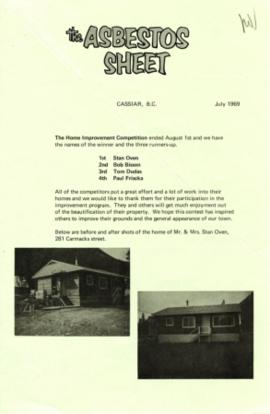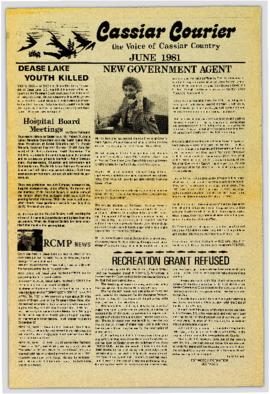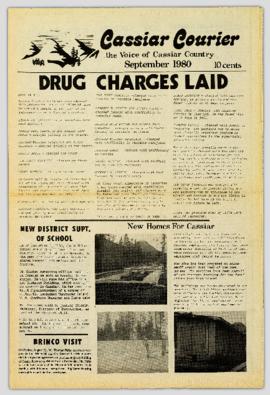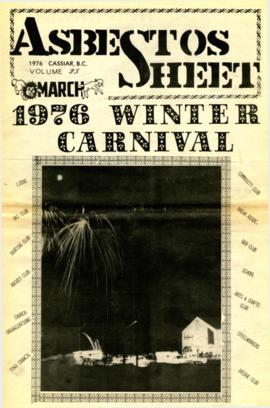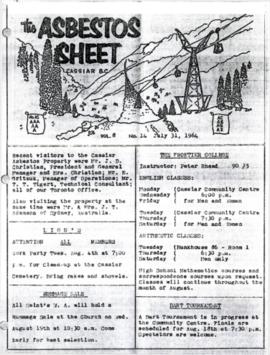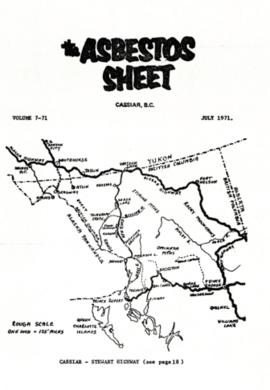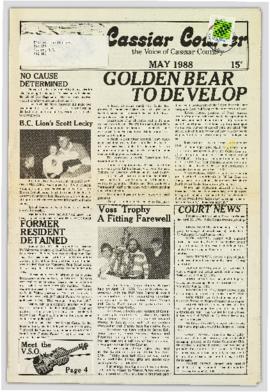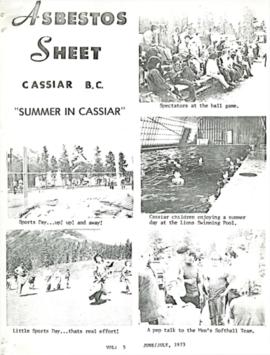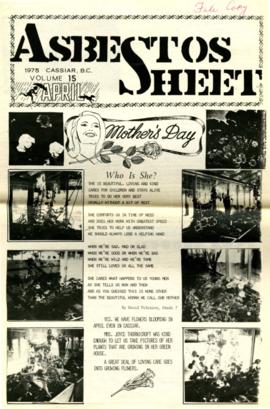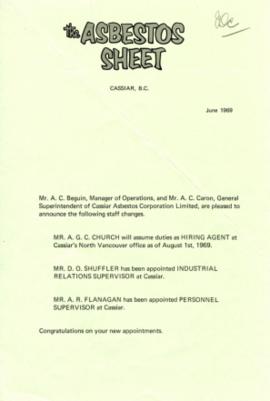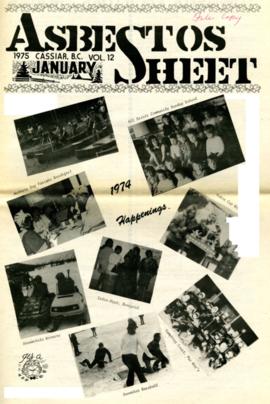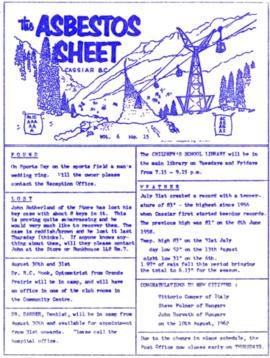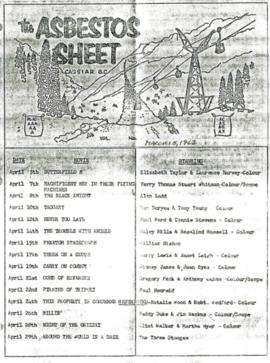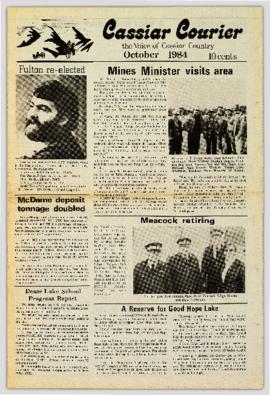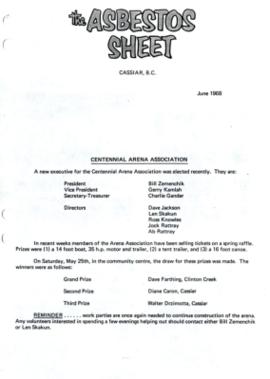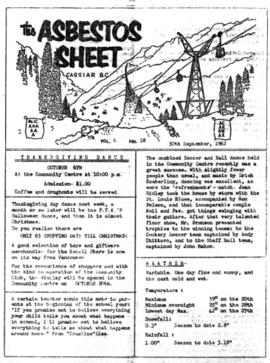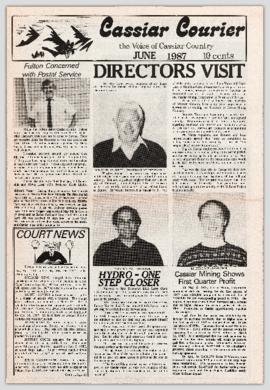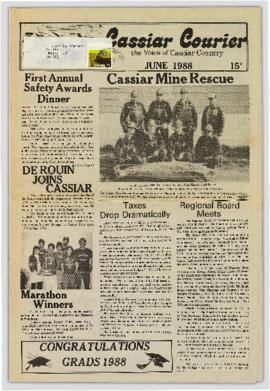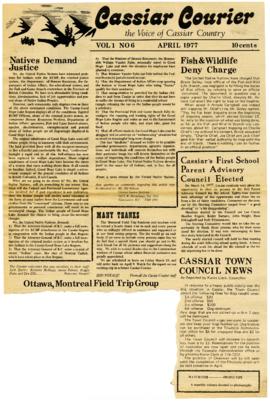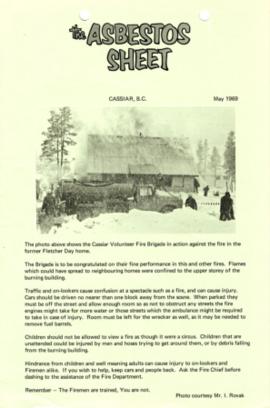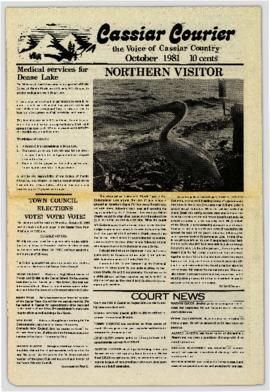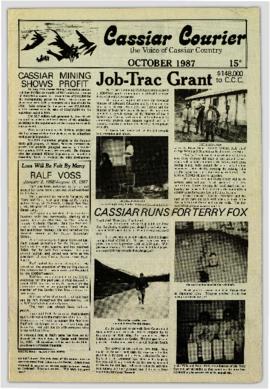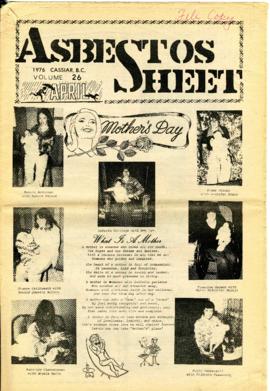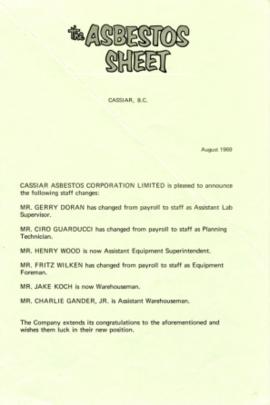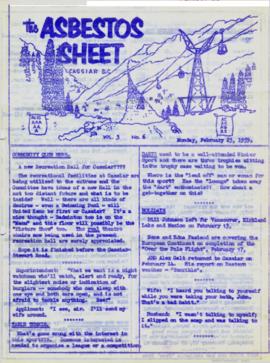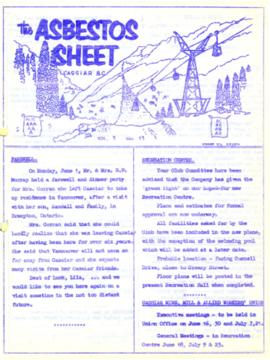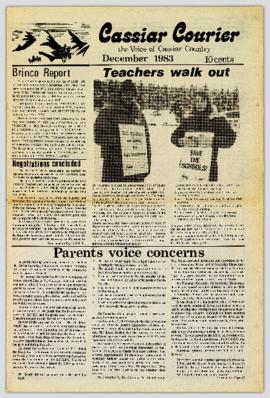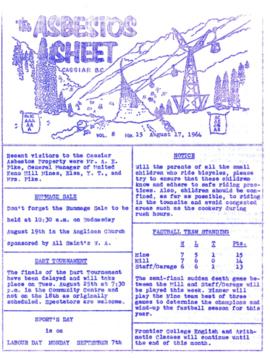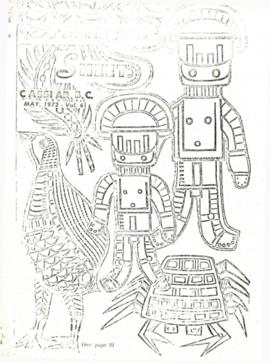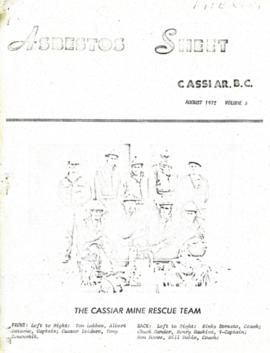"The Asbestos Sheet" is a newspaper that documents the community and work life of the residents of Cassiar BC. Content includes text and photographs, as well as jokes, comics, and games.
This document is a contemporary transcription of a Hudson's Bay Company Fort George (New Caledonia) post journal. The accuracy and completeness of this transcription is not verified.
"The Cassiar Courier" is a newspaper that documents the community and work life of the residents of Cassiar BC. Content includes text and photographs, as well as jokes, comics, and games.
"The Asbestos Sheet" is a newspaper that documents the community and work life of the residents of Cassiar BC. Content includes text and photographs, as well as jokes, comics, and games.
File consists of a transcript of an oral history interview with Jim and Dianne Humphreys.
Item consists of a typewritten report together with three earlier complete or partial drafts of this report “A. H. Phipps Memoirs of Charles E. Bedaux Sub-Arctic Expedition 1934” along with original notebook which includes 11 pages of handwritten notes about the expedition.
File consists of a transcript of an oral history interview with John Broderick.
"The Cassiar Courier" is a newspaper that documents the community and work life of the residents of Cassiar BC. Content includes text and photographs, as well as jokes, comics, and games.
"The Cassiar Courier" is a newspaper that documents the community and work life of the residents of Cassiar BC. Content includes text and photographs, as well as jokes, comics, and games.
File consists of the following articles and speeches written by Knox McCusker:
- "Reminiscences of Knox McCusker" (63 typewritten pages)
- "Back and Beyond the Peace" by K.McCusker (taken from the Toronto Star Weekly Saturday May 5, 1928) – retyped
- "The Alaska Highway" by Knox F. McCusker, D.L.S. (The Canadian Surveyor, July 1943)-photocopy
- Mr. McCusker's speech (5 pages)
- “Tropical Valleys of B.C.” (4 pages)
- "The president has called me an old old surveyor…" speech written by K. McCusker
- "In the early days of my career in the Surveying profession…" written by K. McCusker
"The Cassiar Courier" is a newspaper that documents the community and work life of the residents of Cassiar BC. Content includes text and photographs, as well as jokes, comics, and games.
"The Asbestos Sheet" is a newspaper that documents the community and work life of the residents of Cassiar BC. Content includes text and photographs, as well as jokes, comics, and games.
Item is a photocopy reproduction of part 5 of "Collecting Plants Beyond the Frontier in Northern British Columbia" by Mary Gibson Henry. The article is a photocopy of a reprint from the 1935 issue of the National Horticultural Magazine.
"The Cassiar Courier" is a newspaper that documents the community and work life of the residents of Cassiar BC. Content includes text and photographs, as well as jokes, comics, and games.
"The Cassiar Courier" is a newspaper that documents the community and work life of the residents of Cassiar BC. Content includes text and photographs, as well as jokes, comics, and games.
"The Asbestos Sheet" is a newspaper that documents the community and work life of the residents of Cassiar BC. Content includes text and photographs, as well as jokes, comics, and games.
"The Asbestos Sheet" is a newspaper that documents the community and work life of the residents of Cassiar BC. Content includes text and photographs, as well as jokes, comics, and games.
"The Asbestos Sheet" is a newspaper that documents the community and work life of the residents of Cassiar BC. Content includes text and photographs, as well as jokes, comics, and games.
"The Cassiar Courier" is a newspaper that documents the community and work life of the residents of Cassiar BC. Content includes text and photographs, as well as jokes, comics, and games.
This document is a contemporary transcription of a Hudson's Bay Company Fort George (New Caledonia) post journal. The accuracy and completeness of this transcription is not verified.
"The Asbestos Sheet" is a newspaper that documents the community and work life of the residents of Cassiar BC. Content includes text and photographs, as well as jokes, comics, and games.
Item is a photocopy reproduction of "A Thousand Miles Exploring on Horseback in Northern British Columbia" by Mary Gibson Henry. The original document may have been a draft article written for the Canadian Geographical Society in 1935.
File consists of a transcript of an oral history interview with Doug Homme. Also includes photocopies of Doug Homme's personal records, such as photographs.
File consists of a transcript of an oral history interview with John and Bernice Trick.
"The Asbestos Sheet" is a newspaper that documents the community and work life of the residents of Cassiar BC. Content includes text and photographs, as well as jokes, comics, and games.
"The Asbestos Sheet" is a newspaper that documents the community and work life of the residents of Cassiar BC. Content includes text and photographs, as well as jokes, comics, and games.
"The Asbestos Sheet" is a newspaper that documents the community and work life of the residents of Cassiar BC. Content includes text and photographs, as well as jokes, comics, and games.
"The Asbestos Sheet" is a newspaper that documents the community and work life of the residents of Cassiar BC. Content includes text and photographs, as well as jokes, comics, and games.
File consists of a transcript of an oral history interview with Myra and Glen Hooker.
"The Asbestos Sheet" is a newspaper that documents the community and work life of the residents of Cassiar BC. Content includes text and photographs, as well as jokes, comics, and games.
"The Cassiar Courier" is a newspaper that documents the community and work life of the residents of Cassiar BC. Content includes text and photographs, as well as jokes, comics, and games.
"The Asbestos Sheet" is a newspaper that documents the community and work life of the residents of Cassiar BC. Content includes text and photographs, as well as jokes, comics, and games.
"The Asbestos Sheet" is a newspaper that documents the community and work life of the residents of Cassiar BC. Content includes text and photographs, as well as jokes, comics, and games.
File consists of an official regional park plan for the Regional District of Fraser-Fort George.
"The Cassiar Courier" is a newspaper that documents the community and work life of the residents of Cassiar BC. Content includes text and photographs, as well as jokes, comics, and games.
"The Cassiar Courier" is a newspaper that documents the community and work life of the residents of Cassiar BC. Content includes text and photographs, as well as jokes, comics, and games.
"The Cassiar Courier" is a newspaper that documents the community and work life of the residents of Cassiar BC. Content includes text and photographs, as well as jokes, comics, and games.
"The Asbestos Sheet" is a newspaper that documents the community and work life of the residents of Cassiar BC. Content includes text and photographs, as well as jokes, comics, and games.
"The Cassiar Courier" is a newspaper that documents the community and work life of the residents of Cassiar BC. Content includes text and photographs, as well as jokes, comics, and games.
"The Cassiar Courier" is a newspaper that documents the community and work life of the residents of Cassiar BC. Content includes text and photographs, as well as jokes, comics, and games.
"The Asbestos Sheet" is a newspaper that documents the community and work life of the residents of Cassiar BC. Content includes text and photographs, as well as jokes, comics, and games.
Item is a photocopy reproduction of part 8 of "Collecting Plants Beyond the Frontier in Northern British Columbia" by Mary Gibson Henry. The article is a photocopy of a reprint from the 1935 issue of the National Horticultural Magazine.
"The Asbestos Sheet" is a newspaper that documents the community and work life of the residents of Cassiar BC. Content includes text and photographs, as well as jokes, comics, and games.
"The Asbestos Sheet" is a newspaper that documents the community and work life of the residents of Cassiar BC. Content includes text and photographs, as well as jokes, comics, and games.
"The Asbestos Sheet" is a newspaper that documents the community and work life of the residents of Cassiar BC. Content includes text and photographs, as well as jokes, comics, and games.
"The Cassiar Courier" is a newspaper that documents the community and work life of the residents of Cassiar BC. Content includes text and photographs, as well as jokes, comics, and games.
Audio recording consists of an interview conducted by Bridget Moran with Mary John.
Audiocassette Summary
Context: Recording is the continuation of earlier sessions by Bridget and Mary John talking about her life – appears to continue on from the other tape sessions numbered to #8 [Accession # 2008.3.1.211.4]
Side 1: “Mary John #9”
0’05” Bridget interviews Mary John and asks about Mary John’s grandmother who lived at the reserve at Fort George. Mary notes that her grandmother was sent back to Fort George and then to Stoney Creek after husband died. Her Grandmother remarried; she died in the 1950s. Mary talks about her grandmother’s marriage with Za (Jean) Paul – that was not an arranged marriage; her Grandmother “she had a hard life”
4’00” – 7’30” Mary Johns’ mother married Johnny Paul – not arranged; Mary notes that she was born in Fort George. Mary lived with her Grandmother Ann on reserve in Fort George. Mary then talks about her sister Bella – who married Mike Ketlo (sp?) and their children. She died of tuberculosis in the 1950s.
7’40” Bridget asks about the Mission School in Fort St. James – near the church “that is on Mission land” Which is where the village originally started. They talk about the church’s history briefly.
9’00”-14’00” Bridget asks Mary about her schooling at Lejac – Mary says they had reading, writing, arithmetic, penmanship and history. There was no science taught. Mary then describes the routine at Lejac. Doing chores and then breakfast at about 7:30 and then did cleaning chores in the dormitories. Then they attended their classes; then lunch, then played outside and then came back for sewing or embroidery, knitting and then back in classes until 4:00pm. Mary describes recreation – swimming, playing in the field, chores – pulling roots/stumps etc. Bridget talks about Joanne (Fiske?) thesis on the distinction between native boys and native girls’ activities and education at the residential school and that it enabled them to go to work in the hospitals and offices but that the farming education that was taught to the boys didn’t help them as there was no agriculture on the reserves. Mary notes she was ‘teachers pet’ as she had music lessons for singing. Mary notes she didn’t do anything in the kitchen but took mail to the post office and looking after the office for the Mother Superior. She feels she learned ‘the basics’ [but] then they ‘kicked you out at 16’
15’00” Bridget asks about the differences in disciplining methods of children – she notes that it is not part of Indian culture to spank children. She notes it is part of her husband’s sisters to discipline her children – not her or her husband’s duty
17’00” Mary talks about the residents at Stoney Creek who objected to school at Lejac because of harsh disciplinary methods used with their children
18’00” Mary talks briefly about the food at Lejac and speaks briefly to another unidentified woman [Sabrina?] in the room about food preparation [canning?]
19’50” Bridget asks about the Stoney Creek residents who wanted to have a school at the village in the 1950s and wanted their children to go to school there.
20’00” Mary speaks briefly about Father Coccola and that he did the negotiation about the move of the people from the reserve at Fort George to Shelley and about some compensation acquired by the residents. Bridget notes he ‘did not do a favour to the Indians’ – Mary notes that they were forced to leave ‘very illegal’
22’00” Mary speaks again about Father Coccola who could be ‘a very strict man’ but who took care of the people when they were sick and dying
23’00” Mary talks about another priest (unidentified) that she really liked who gave her a job c.1935 when she and her husband cleared land for Lejac and the priest treated them really well. She thinks he was from the Yukon as he had gold nuggets
25’00” Mary talks about her children going to Lejac in the 1950’s
26’00” Bridget talks about a social worker who came to Stoney Creek in c.1955 and Bridget was asked to come out by the Indian Agent to investigate what was the issue. This social worker was scared of being on the reserve; Mary thinks this woman had marital problems and drank a lot
28’00” Mary talks about the Day school operating c.1951 for a short time and the kids were bussed back and forth; other kids ‘orphans’ went to Lejac (lived there)
Tape is poor after this; noise with squeals and recording is faster
29’00” Mary talks about her children (Helen and the boys) not liking Lejac. She notes that one of the boys didn’t like it ‘but didn’t complain’ about it. She notes that ‘no one would talk about it’ “the whole village would be silent” when they left; and the children would be crying.
30’00”-33’00” Bridget asks Mary to discuss her wedding in more detail – Bridget notes that she already has on tape about the wedding night itself but asks for more information about the wedding day. Mary begins to talk about the wedding; there was a Mass, the guests and there was a band….
Tape is unintelligible after this; recording is broken up with interference and then there is no recording End of side 1
Side 2 “Mary John #10”
This side of the cassette has no recording
"The Asbestos Sheet" is a newspaper that documents the community and work life of the residents of Cassiar BC. Content includes text and photographs, as well as jokes, comics, and games.
"The Asbestos Sheet" is a newspaper that documents the community and work life of the residents of Cassiar BC. Content includes text and photographs, as well as jokes, comics, and games.
"The Asbestos Sheet" is a newspaper that documents the community and work life of the residents of Cassiar BC. Content includes text and photographs, as well as jokes, comics, and games.
